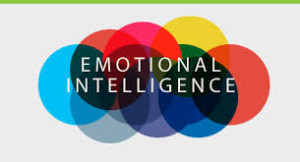 Like many concepts, EMOTIONAL INTELLIGENCE (EQ) is something people knew about and described for years before someone (in this case, Daniel Goleman) hung a label on it that stuck.
Like many concepts, EMOTIONAL INTELLIGENCE (EQ) is something people knew about and described for years before someone (in this case, Daniel Goleman) hung a label on it that stuck.
EQ was a clever play on words—IQ was short for Intelligence Quotient, and EQ has become short for the intelligence that extends beyond sheer brain power—the Emotional Quotient. Individuals had been described as having book-smarts but not common sense, as being intelligent but insensitive, and so on. Goleman was the person who captured this dichotomy with the appealing and enduring label, Emotional Intelligence. Although traditional IQ appears to be relatively fixed, EQ can be improved at any age.
EQ has ebbed and flowed in popularity and usage, and continues to be used and sustained by counselors, coaches and many of those who analyze human interactions.
WHAT EXACTLY IS EQ?
Searching the web provides over one million results for this question, including reference to an early summary article published in Time magazine in October of 1995. We at Parrish Partners like this definition: “EQ is the ability to identify, use, understand and manage emotions in positive ways to relieve stress, communicate effectively, empathize with others, overcome challenges and defuse conflict.”
EQ is important in achieving success and happiness in our lives and careers. We are social creatures in a social world. Working effectively with and through others is the very thing that separates average performance from exceptional performance, according to Daniel Goleman. “90% of the difference between star performers and average performers in senior leadership positions is EQ,” he states.
“HOW DO I IMPROVE MY EQ?”
One way to start is with an EQ assessment. At Parrish Partners, we offer a target EQ assessment that quickly identifies areas in which you can improve. The ability to understand yourself and to form an accurate concept of who you are is essential in maximizing your effectiveness.
Improving your EQ and your Insight go together. Insight refers to how well you understand yourself, other people, and your impact on them. Understanding yourself begins with a self-reflective posture. How others see you is sometimes more important than how you see yourself.
Understanding others and being able to “read” their motives and needs begins with a genuine interest in influencing others positively. This does not just mean doing nice things for people; but additionally, making a difference in their lives.
You can definitely improve your EQ. This improvement is not so difficult if you are truly committed to changing your effectiveness as a leader, and as a human being. Consider working with a coach for making steady, perhaps even breakthrough progress—experiencing the fun and growth of an exciting journey!
© Copyright Michele Parrish, 2015. Editorial Contributions by Norm Lanier
Related article: EQ and The Future of Work
